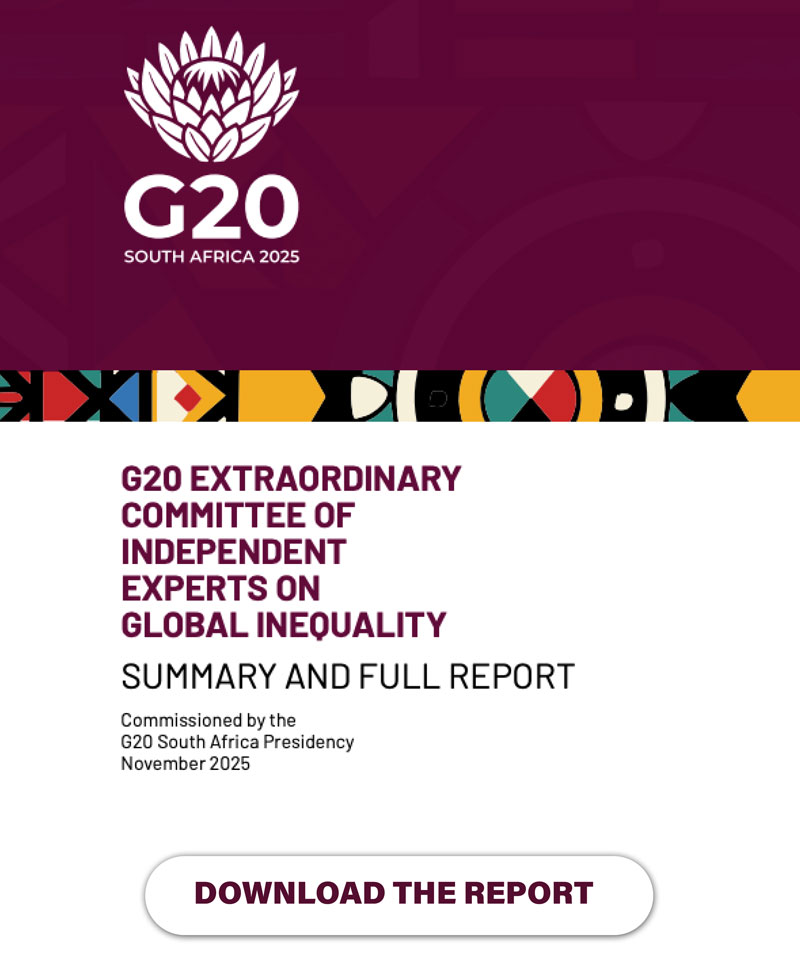The current inequality emergency is a policy choice
-
The Southern Centre for Inequality Studies (SCIS) welcomes the release of the recently launched G20 Extraordinary Committee of Independent Experts’ Report on Global Inequality. The committee unveiled the first-ever report on inequality to the G20 on 4 November 2025.
As the Director of SCIS, a Centre established to undertake research on the growing levels of inequality across the world, especially in the global South, it is an honour to serve as a member of the Extraordinary Committee of Independent Experts on Global Inequality, commissioned by President Cyril Ramaphosa for South Africa’s Presidency of the G20.
The Extraordinary Committee is chaired by Nobel Prize-winning economist Professor Joseph Stiglitz (USA) and comprises four other colleagues, and leading global experts, Dr Adriana E. Abdenur (Brazil), Ms Winnie Byanyima (Uganda), Professor Jayati Ghosh (India), and Dr Wanga Zembe-Mkabile (SAMRC, UWC, South Africa).
The decision by President Ramaphosa to place inequality at the heart of the G20 agenda is historic. It marks a significant step forward on the long road toward greater equality. It is no coincidence that countries from the Global South—Brazil and South Africa—have led the charge to put tax justice and social justice on the G20 agenda in recent years.
This Global Inequality Report offers a snapshot of the forces giving rise to inequality and the state of inequality. It comes amid heightening concern about ‘the global increase in incomes and wealth at the upper end of the scale’ and the increasing challenges large parts of the population face in making ends meet. In analysing policies that could help to alleviate inequality, the report focuses particularly on the international level, including efforts to rein in corporate concentration and efforts to reform the international tax architecture that are already on the G20 agenda.
The report’s findings are both alarming and immediate. It highlights that global wealth inequality exceeds income inequality by a wide margin. From 2000 to 2024, the richest 1% amassed 41% of all new wealth, whereas the bottom 50% of the world’s population gained only 1%. Furthermore, one of the key recommendations that we make is the creation of a new international and independent panel, modelled after the IPCC, that would monitor trends and assess its drivers and consequences and evaluate alternative policies for addressing it, to inform governments, policy makers, and the international community.
“Every country has scope to address inequality at the national level, and it is in every country’s strategic interest to cooperate internationally. Yet one thing became clear when we were writing our report. While there is a wealth of academic literature about inequality, there is not a single central body that assesses the global state of inequality. Indeed, many estimates seem to have severely underestimated the level of inequality in our societies. Without proper scrutiny, inequality has spiralled out of control – and it’s time to get a hold of it.” - Imraan Valodia, Professor of Economics, Pro Vice-Chancellor: Climate, Sustainability and Inequality at Wits University, and Director of the Southern Centre for Inequality Studies.
Click below to download the statement
The current Inequality emergency is a policy choice


